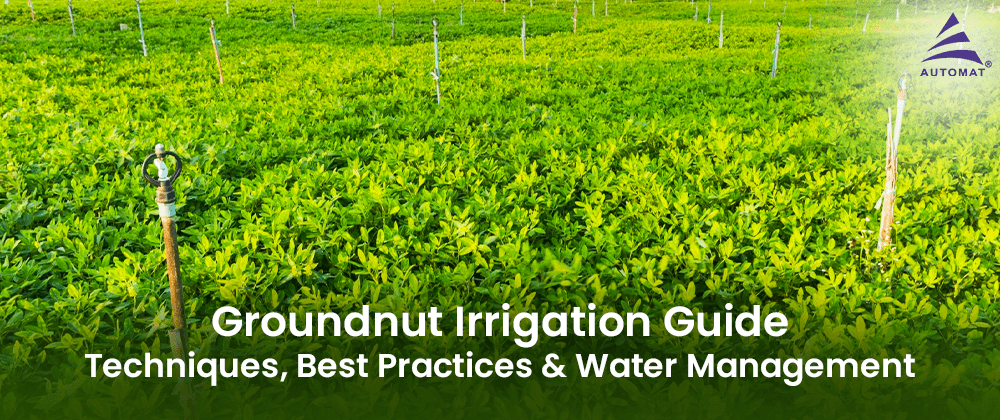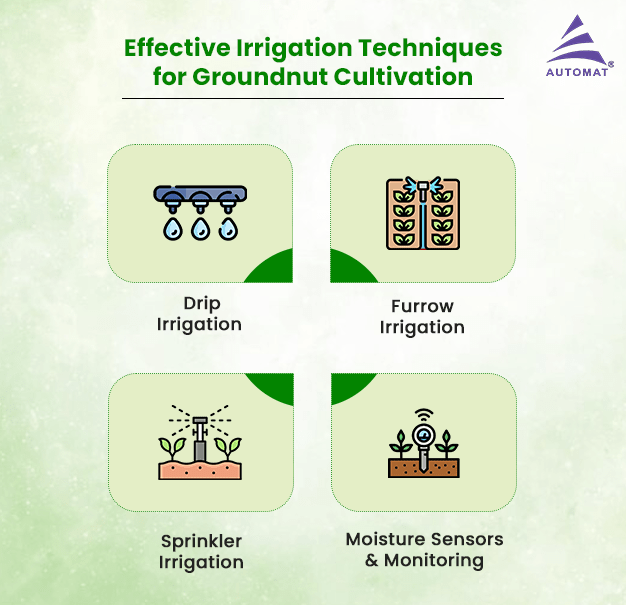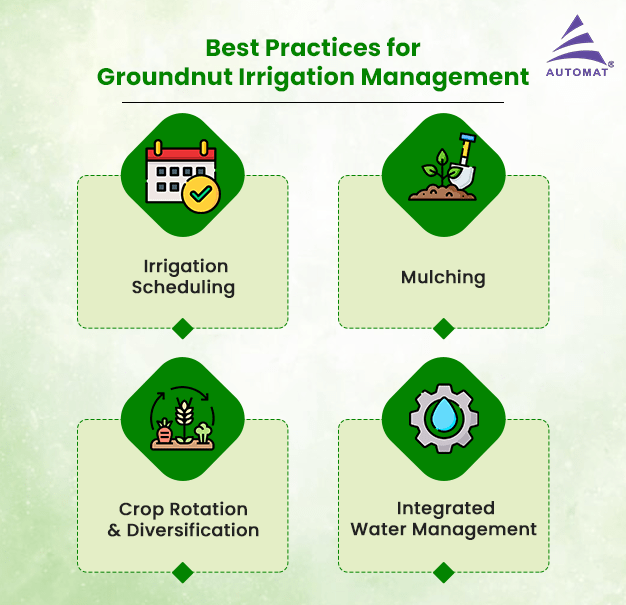
Groundnut, also known as peanut, is a vital crop globally, valued for its high protein content and versatility in various culinary and industrial applications. Cultivating groundnuts demands meticulous attention to irrigation, as this directly impacts plant growth, pod development, and yield. In this comprehensive guide, we’ll dig into the intricacies of groundnut cultivation, focusing specifically on understanding groundnut irrigation needs and implementing effective techniques to enhance productivity.
Understanding Groundnut Cultivation
Ideal Growing Conditions
Before delving into irrigation specifics, let’s grasp the fundamentals of groundnut cultivation. Groundnuts thrive in warm climates with well-drained sandy loam soils. They are sensitive to waterlogging, making soil drainage a crucial factor in their cultivation.
Growth Stages
Groundnut plants undergo distinct growth stages: germination, vegetative growth, flowering, peg penetration, pod development, and maturation. Each stage requires appropriate irrigation to support optimal growth and development.
Factors Influencing Groundnut Irrigation Needs
Several factors influence groundnut irrigation requirements, including:
1. Soil Type and Moisture Holding Capacity
Sandy soils drain quickly and require more frequent irrigation, while clay soils retain moisture better but may suffer from waterlogging if over-irrigated.
2. Climate
Groundnut cultivation regions experiencing hot, dry climates necessitate more frequent and consistent irrigation to mitigate water stress.
3. Growth Stage
Irrigation frequency and volume vary throughout the groundnut growth cycle, with critical stages such as flowering and pod development requiring careful water management to ensure optimal yield.
4. Water Quality
Groundnut plants are sensitive to salinity and alkalinity in irrigation water, necessitating monitoring and managing water quality to prevent adverse effects on plant growth.
Effective Irrigation Techniques for Groundnut Cultivation

Farmers must employ suitable irrigation techniques tailored to their growing conditions to optimize groundnut yield. Here are some effective methods:
1. Drip Irrigation
Drip irrigation delivers water directly to the root zone, minimizing water wastage and reducing the risk of fungal diseases. It ensures consistent moisture levels, promoting healthy plant growth and maximizing yield. Additionally, drip irrigation allows for precise water and nutrient management, enhancing resource efficiency and reducing production costs.
2. Furrow Irrigation
Furrow irrigation involves creating shallow channels (furrows) between crop rows and flooding them with water. While less water-efficient than drip irrigation, furrow irrigation is suitable for groundnut cultivation in flat or gently sloping terrain. Proper furrow design and management are essential to minimize water loss through runoff and ensure uniform moisture distribution across the field.
3. Sprinkler Irrigation
Sprinkler irrigation involves spraying water over the crop canopy, simulating natural rainfall. It is well-suited for groundnut cultivation in areas with limited water availability or uneven terrain. However, sprinkler irrigation may increase the risk of foliar diseases if water accumulates on the foliage. Proper scheduling and monitoring are crucial to prevent water stress or excess moisture.
4. Moisture Sensors and Monitoring
Utilizing moisture sensors and monitoring tools enables farmers to assess soil moisture levels accurately and schedule irrigation based on plant needs. Real-time data helps optimize irrigation scheduling, preventing under or over-watering and minimizing water wastage. Integrating technology into irrigation management enhances efficiency and productivity while conserving water resources.
Also, read How Can Sprinkler Irrigation System Help Increase Crop Yield
Best Practices for Groundnut Irrigation Management

In addition to selecting appropriate irrigation techniques, implementing best practices is vital for successful groundnut cultivation:
1. Irrigation Scheduling
Develop a customized irrigation schedule based on soil moisture, weather forecasts, and crop growth stages. Adjust irrigation frequency and duration to meet plant water requirements while avoiding water stress or saturation.
2. Mulching
Applying organic mulch to the soil surface helps conserve moisture, suppress weed growth, and maintain soil temperature, reducing water evaporation and improving water infiltration. Mulching is particularly beneficial in arid or semi-arid regions where water conservation is paramount.
3. Crop Rotation and Diversification
Practicing crop rotation and diversification reduces the risk of soil-borne diseases and pest infestations, enhancing groundnut yield and sustainability. Rotate groundnut with nitrogen-fixing legumes such as soybeans or pulses to improve soil fertility and moisture retention.
4. Integrated Water Management
Integrate water-saving practices such as rainwater harvesting, on-farm water storage, and efficient irrigation system design to maximize water use efficiency and minimize reliance on external water sources. Implementing integrated water management strategies enhances resilience to climate variability and ensures long-term agricultural viability.
Conclusion
Mastering irrigation techniques is essential for maximizing groundnut yield and profitability. By understanding the irrigation needs of groundnut plants and implementing appropriate strategies and best practices, farmers can optimize water use efficiency, enhance crop productivity, and sustainably manage water resources.
Groundnut cultivation holds immense potential for food security and economic development, making farmers need to prioritize efficient irrigation management practices.
Are you looking to optimize your groundnut irrigation practices and achieve superior yields? Automat Industries offers a comprehensive suite of advanced irrigation solutions, including cutting-edge drip irrigation systems, moisture sensors, and automated irrigation controllers. Automats’ innovative technologies empower farmers to make data-driven decisions, conserve water resources, and maximize their groundnut cultivation potential.
Contact Automat Industries today to learn how we can help you cultivate a thriving and sustainable groundnut crop!




